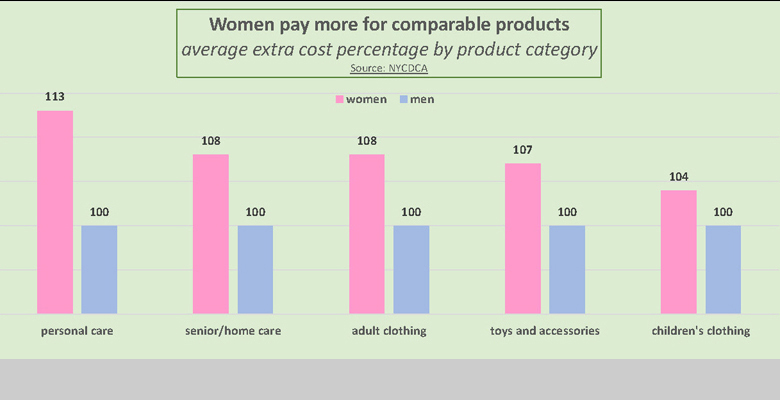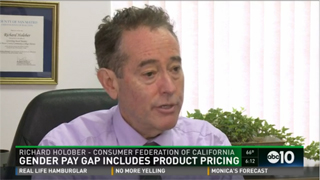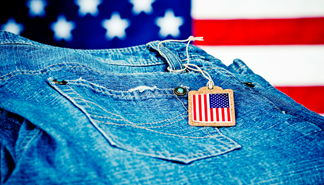Tag Archives: CFC Sponsored Legislation
Bill Aims To End ‘Pink Tax’ On Products
by Alia Ismay, San Diego Union-Tribune

Hueso’s Senate Bill 899 is sponsored by the Consumer Federation of California. It states that “no business establishment of any kind whatsoever may discriminate, with respect to the price charged for goods of a substantially similar or like kind, against a person because of the person’s gender.” Products are defined as “substantially similar” when they are the same brand, have the same functional components and share 90 percent of the same materials or ingredients. … The bill does not prohibit price differences based on labor, material or other “gender-neutral” factors. Read More ›
State Senate Looks At Banning Gender-Based Bias In Retail Pricing
by Bob Egelko and Melody Gutierrez, San Francisco Chronicle

Lisa Cuesta, a constituent of [SB 899 author Ben] Hueso’s in Chula Vista and chief operations officer of Casa Familiar, a social services nonprofit … [is] the mother of a 7-year-old girl and a 4-year-old boy and says she’s unhappily gotten accustomed to paying $1 to $3 more for toy building blocks or plastic cars and trucks that are pink, purple or yellow — pastels marketed as girls’ colors, she said. “I don’t have the luxury or the time to go into the boys’ section and into the girls’ section” to look for the best deal, Cuesta said in an interview. Read More ›
Women’s Products That Cost More Than Men’s? It’s Called The ‘Pink Tax’, And Not Everyone’s Mad
by Teri Sforza, Orange County Register

Richard Holober, executive director of the Consumer Federation, said with exasperation that a Levi’s One Pocket Boyfriend Shirt has been marketed to women for $78. Their boyfriends, he said, could buy a nearly identical shirt for $48. “Add the word ‘boyfriend’ and put the shirt on a woman, and the price goes up by $30,” Holober said. “Businesses have figured out, through a lot of research, how to extract extra dollars by giving products a veneer of being designed especially for girls or women. But that’s not right.” Read More ›
Gender-Based Price Differences Could Be Banned
by Allen Young, Sacramento Business Journal

Senate Bill 899 passed the Senate Judiciary Committee along party lines this week and now heads to the Senate floor. … Female consumers pay 7 percent more on average for products that are essentially the same as the male version, according to a study released in December by a public consumer watchdog agency in New York City. The study looked at 800 consumer products with “clear male and female versions” and found that products targeted toward girls and women were more expensive 42 percent of the time. Read More ›
Gender Pay Gap Includes Product Pricing
by Gabrielle Karol, ABC10, Sacramento

The Consumer Federation of California sponsored [SB 899], which was authored by State Senator Ben Hueso (D-San Diego). The bill’s motivation is a December report from New York’s Department of Consumer Affairs. In the report, nearly 800 products are compared at two dozen different retailers. Forty-two percent of the time, women’s products are priced higher than men’s products. The so-called “pink tax” means shoppers are paying an average seven percent more for items targeted to women. Read More ›
CFC Sponsors SB 899 (Hueso) To End Gender Bias In Retail Prices

6/30 update: Senator Ben Hueso (D-San Diego) dropped SB 899 today after it became apparent that a majority of the Assembly Judiciary Committee would not support the bill unless he accepted amendments proposed by the committee’s leadership that would have eviscerated the bill. Women shouldn’t be charged … Read More ›
The Pink Tax: Why Women’s Products Often Cost More
by Susan Johnston Taylor, U.S. News & World Report

According to a study of gendered pricing released by New York City Department of Consumer Affairs last year, shampoo and conditioner marketed to women cost an average of 48 percent more than those marketed to men, while women’s jeans cost 10 percent more than men’s, and girls’ bikes and scooters cost 6 percent more than boys’. Overall, the study found that products marketed to women cost more 42 percent of the time. … Some items marketed to women not only cost more but actually contain less of the product because manufacturers make the product smaller and more feminine-looking. Read More ›
Consumer Federation Of California Releases 2015 Scorecard For State Lawmakers
The Consumer Federation of California (CFC) has released its 2015 Scorecard for State Legislators, which rates lawmakers on the votes they cast on key issues, including privacy, automobile safety, household toxics, truth in advertising, living wages, reform of the California Public Utilities Commission, and other consumer protection … Read More ›
California Now Allows Firms To Tell Consumers A ‘Made In USA’ Lie
by David Lazarus, Los Angeles Times

Gov. Jerry Brown signed a bill, SB 633, this month that allows California companies to say “made in America” as long as their products are mostly made in America — 90% American-made, to be precise. … Richard Holober, executive director of the Consumer Federation of California, said manufacturers never had trouble in the past meeting the state’s made-in-America rule. Loosening the state’s 100% standard, he said, puts “those businesses who go the extra mile to keep jobs and manufacturing in the USA at a disadvantage” and “gives an advantage to companies that cut corners.” Read More ›
As An Insider Speaks Out, Chemical Industry’s Credibility Sinks
by the Editorial Board, The Sacramento Bee

Last year, Sen. Mark Leno, D-San Francisco, whose previous legislative attempts to restrict flame retardants had died in part because of [former industry lobbyist turned whistleblower Grant] Gillham, won approval of a bill requiring that products containing the flame retardants be labeled. Now, with Gillham as an ally, Leno is carrying a new bill, SB 763, which would require labeling of products for juveniles such as napping pads. It deserves passage, no matter what the American Chemistry Council says. Read More ›
American Chemistry Council Lied About Lobbying Role On Flame Retardants, Consultant Says
by David Heath, The Daily Beast

The American Chemistry Council has long maintained that it had nothing to do with an enormously successful but deceitful lobbying effort in state capitals to defend the use of potentially ineffective and toxic flame retardants in furniture. Now, in a rare breaking of ranks, a top industry consultant is discrediting that story. … He stepped up to a microphone at a California State Senate hearing to announce his support for a bill [CFC-co-sponsored SB 763] requiring labeling of children’s products containing the chemicals. Read More ›
Privacy Getting Taken For A Ride
by Samantha Gallegos, Capitol Weekly

Sponsored by the Consumer Federation of California, a non-profit consumer-rights advocacy group, [Assembly Member Ed] Chau’s bill would set up privacy standards related to “personally identifiable data” that [Transportation Network Companies] — like Uber or Lyft — would be required to follow. Those standards don’t exist now, Chau said. “I guess you could say, well, protecting some personal data is better than protecting none,” said Richard Holober, executive director of the Consumer Federation. “Right now none is protected. And I don’t believe the flawed argument that Internet-based companies should have greater freedom than the other businesses who collect and share data.” Read More ›
California Bill Would Force Uber To Guard Passenger Privacy
by Carolyn Said, San Francisco Chronicle

A bill pending in Sacramento would force Uber, Lyft and other ride-hailing companies to follow stricter privacy rules. AB886 specifies that the smartphone-ordered ride services cannot disclose any data on passengers except to combat fraud or other crimes. It also says the companies must destroy all personal information when customers cancel their accounts. “We want to put the consumers in the driver’s seat about who owns their data and personal information, instead of having them take a back seat,” said bill author Assemblyman Ed Chau. Read More ›